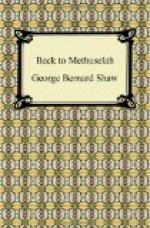INCREDULOUS VOICES. Oh, come! Tell us another. Really, Pyg! Get out. You havnt. What a lie!
PYGMALION. I tell you I have. I will shew them to you. It has been done before. One of the very oldest documents we possess mentions a tradition of a biologist who extracted certain unspecified minerals from the earth and, as it quaintly expresses it, ’breathed into their nostrils the breath of life.’ This is the only tradition from the primitive ages which we can regard as really scientific. There are later documents which specify the minerals with great precision, even to their atomic weights; but they are utterly unscientific, because they overlook the element of life which makes all the difference between a mere mixture of salts and gases and a living organism. These mixtures were made over and over again in the crude laboratories of the Silly-Clever Ages; but nothing came of them until the ingredient which the old chronicler called the breath of life was added by this very remarkable early experimenter. In my view he was the founder of biological science.
ARJILLAX. Is that all we know about him? It doesnt amount to very much, does it?
PYGMALION. There are some fragments of pictures and documents which represent him as walking in a garden and advising people to cultivate their gardens. His name has come down to us in several forms. One of them is Jove. Another is Voltaire.
ECRASIA. You are boring us to distraction with your Voltaire. What about your human beings?
ARJILLAX. Aye: come to them.
PYGMALION. I assure you that these details are intensely interesting. [Cries of No! They are not! Come to the human beings! Conspuez Voltaire! Cut it short, Pyg! interrupt him from all sides]. You will see their bearing presently. I promise you I will not detain you long. We know, we children of science, that the universe is full of forces and powers and energies of one kind and another. The sap rising in a tree, the stone holding together in a definite crystalline structure, the thought of a philosopher holding his brain in form and operation with an inconceivably powerful grip, the urge of evolution: all these forces can be used by us. For instance, I use the force of gravitation when I put a stone on my tunic to prevent it being blown away when I am bathing. By substituting appropriate machines for the stone we have made not only gravitation our slave, but also electricity and magnetism, atomic attraction, repulsion, polarization, and so forth. But hitherto the vital force has eluded us; so it has had to create machinery for itself. It has created and developed bony structures of the requisite strength, and clothed them with cellular tissue of such amazing sensitiveness that the organs it forms will adapt their action to all the normal variations in the air they breathe, the food they digest, and the circumstances about which they have to think. Yet, as these live bodies, as we call them, are only machines after all, it must be possible to construct them mechanically.




